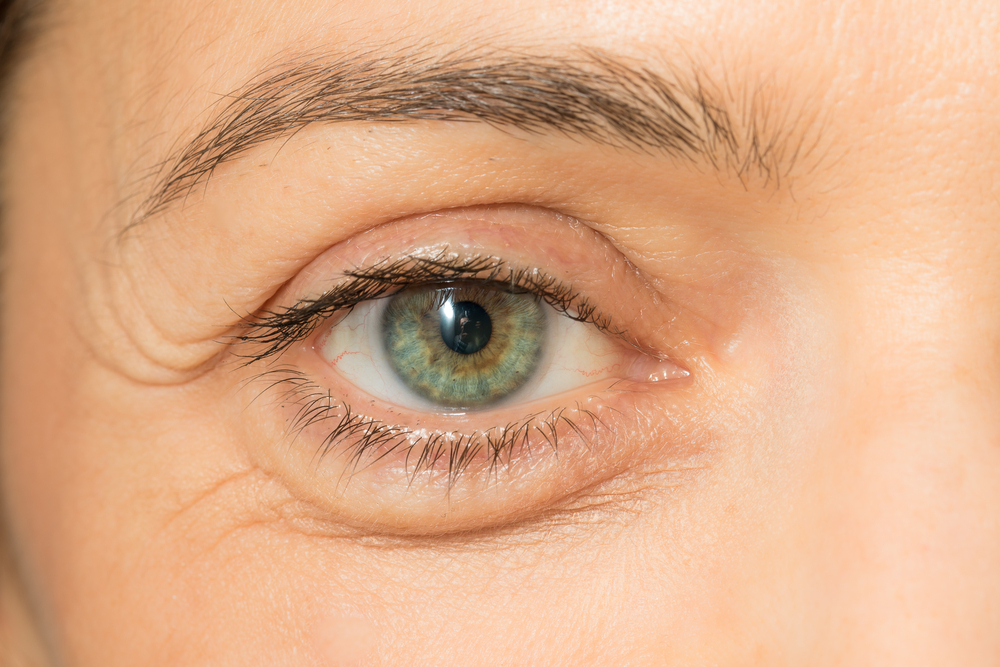- Puffy eyes typically occur as we age, but a few other common causes include genetics, allergies, fluid retention and an unhealthy diet.
- Some lifestyle changes that help remedy puffy eyes include increasing water intake, limiting sodium, using a cold compress, and avoiding alcohol, among others.
- There are also surgical options available, such as blepharoplasty, which can treat puffy eyes.
Are you struggling with puffy eyes? This is a more common occurrence than you’d think. Typically puffy eyes aren’t a reason to worry and there are many lifestyle changes you can make to remedy your puffy eyes. These techniques range from simple at-home practices like limiting your sodium intake to more involved measures such as a cosmetic surgical procedure.
If you’re struggling with puffy eyes, follow along as we break down exactly what causes this occurrence and all the different means you can pursue to treat them.
What Causes Puffy Eyes?
To understand how to treat puffy eyes, it’s important to look at the root of what might be causing it. There are many reasons for puffy eyes, but according to Healthline, one of the most common reasons is aging. As our skin ages, it becomes increasingly more thin and weak, which can cause fat in your upper eyelid to fall and rest in your lower eyelid. It’s also more common for fluid to become trapped in the lower eyelid area as we age.
In addition to aging, a few other primary causes of puffy eyes include genetics, allergies, lack of sleep, fluid retention, sun damage and an unhealthy diet. Many of these reasons are within are control and can be easy lifestyle fixes to create a significant change.
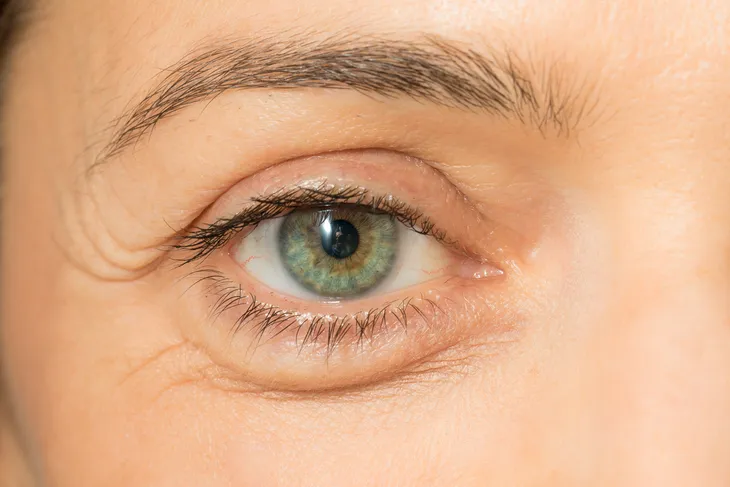 Shutterstock/sruilk
Shutterstock/sruilkEvaluate Your Sleep Habits
Ensuring that you are getting enough sleep on a regularly basis can make a major difference when it comes to puffy eyes. According to sleep experts, adults need around 7 to 9-hours of sleep each night.
If this isn’t the amount of sleeping you’re currently getting, it may be time to reevaluate some of your habits and lifestyle factors. To get a good night’s sleep, Mayo Clinic suggests creating a sleep schedule, turning off devices 1 to 2-hours before sleep, avoiding caffeine 6-hours before sleep, avoiding alcohol close to bedtime and finishing exercise several hours before bedtime.
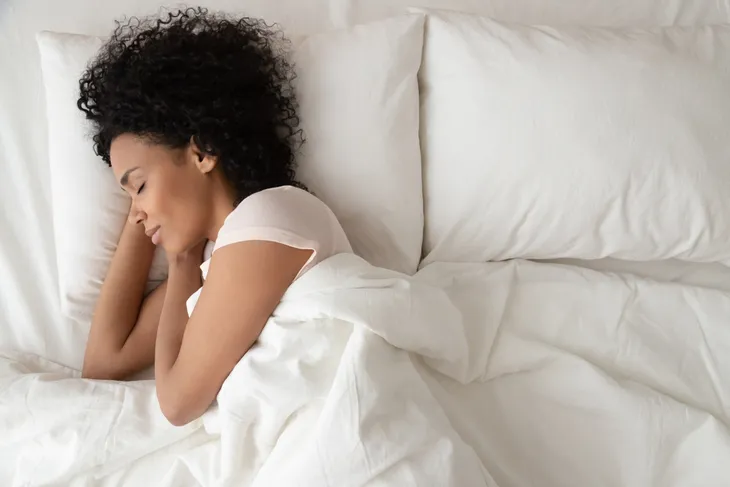 Shutterstock/fizkes
Shutterstock/fizkesCheck Your Water Intake
Dehydration can lead to a long list of health issues and can also further contribute to puffy eyes. To keep your skin healthy, the general rule of thumb is to drink eight 8-ounce glasses of water per day.
To encourage more water intake, you could always infuse your water with fruit to give it some flavor. You could also set up a system on your phone to remind you every hour to drink water, or purchase a water bottle that tracks your water intake throughout the day.
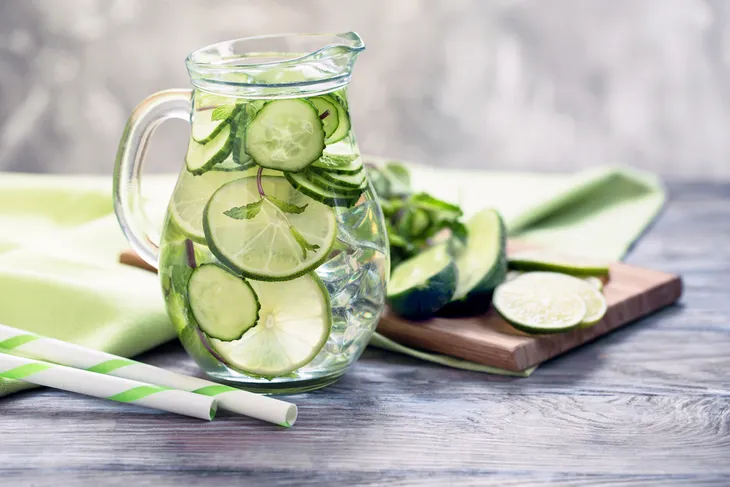 Shutterstock/ShotnCut
Shutterstock/ShotnCutUse a Cold Compress
There are many beauty tools on the market that help to counteract puffy eyes, but if you don’t have any of these available to you, one of the most simple ways to reduce puff is to use a cold compress or cold spoon. This cooling effect can drain excess fluid from the eyelid area to help depuff.
Another simple at-home remedy is to use green or black tea bags. The tea bags contain antioxidants and caffeine which can reduce inflammation and constrict blood vessels to reduce puffiness.
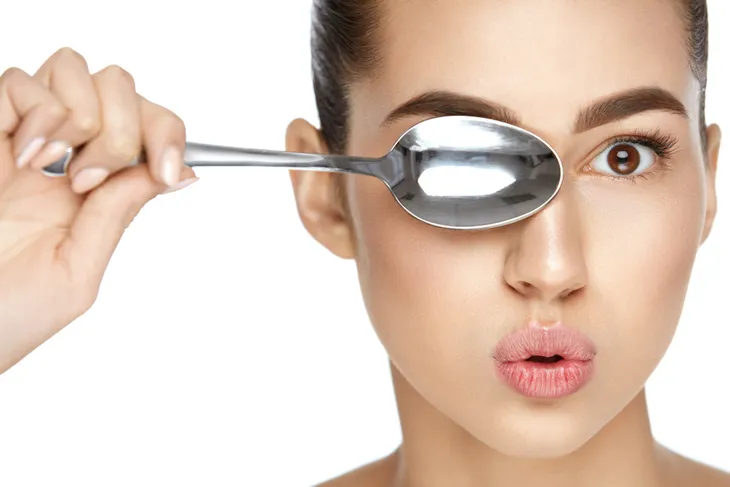 Shutterstock/puhhha
Shutterstock/puhhhaTry an Eye Cream
The products you apply to your skin on a daily basis can have a significant impact on the appearance of your eyes. Many eye creams contain ingredients that help to counteract puffiness and are a helpful tool to add into your beauty routine, especially in the mornings.
A few ingredients to look for in an eye cream include cucumber, chamomile and arnica, which are known to help reduce inflammation, soothe and tighten the eye area.
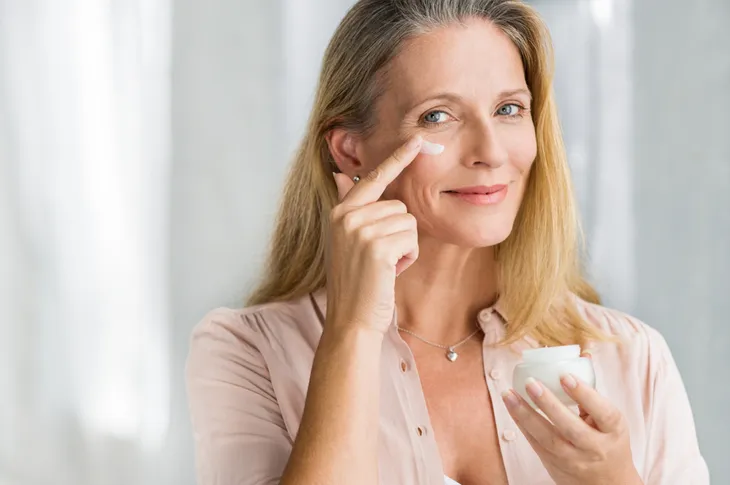 Shutterstock/Rido
Shutterstock/RidoProp Yourself Up
Since fluid retention is a potential cause of puffy eyes, try propping yourself up at night to counteract this effect. You could try sleeping with a few pillows to keep your head upright and to avoid fluid settling around your eye area while you rest.
There are specific pillows, called wedge pillows, that can help you stay propped up while you sleep, or you could simply stack a few pillows under your head for a similar effect.
 Shutterstock/stockfour
Shutterstock/stockfourResolve Your Allergies
Do you struggle with seasonal or year-round allergies? This could be a huge reason why you may be struggling with puffy eyes. One of the most common side effects of allergies is irritated, red, or puffy eyes. You may also be rubbing and itching your eyes more often, which could result in further puffiness.
If you struggle with allergies, it’s best to consult a doctor who can help you create a treatment plan to ease symptoms. This will often include eye drops and over-the-counter or prescription medications.
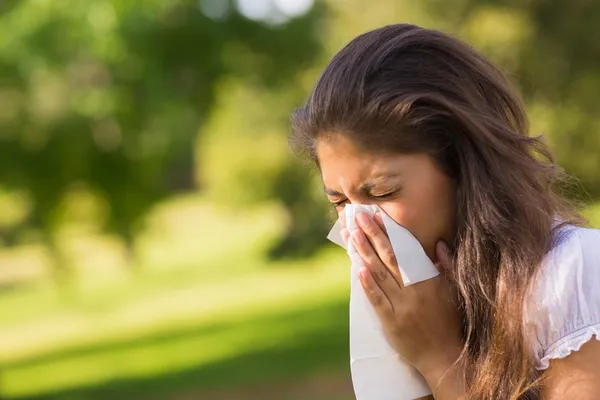 Shutterstock/wavebreakmedia
Shutterstock/wavebreakmediaReduce Sodium Intake
Intaking too much sodium can result in inflammation and fluid retention in the body, which can contribute to the appearance of puffy eyes. It can also lead to serious health conditions such as heart issues and stroke.
Make a conscious effort to limit your salt intake if you’re experiencing puffy eyes and you might be surprised at the results. A few foods that are high in sodium that you should try to avoid include instant soups, cured meats, cheese, breads, and other processed foods. Instead, try to add more whole foods such as fruits and vegetables into your diet.
 Shutterstock/Eviart
Shutterstock/EviartAvoid Alcohol
As mentioned previously, puffy eyes can caused by dehydration. Alcohol consumption is a common cause of dehydration, so it’s best to avoid or limit alcohol if you struggle with puffy eyes.
There are so many delicious drinks out there that you can substitute for alcohol nowadays. You could try creating a mocktail recipe or opt for a flavored sparkling water. You could also trying diffusing your water with fruit for extra flavor while still hydrating your body.
Increase Potassium Intake
Potassium is known for its ability to rid the body of excess fluid. Next time you experience puffy eyes, try increasing your potassium intake and see if this works for you. A few examples of foods with high potassium include bananas, beans, yogurt, and leafy greens.
If you find that you already consume a lot of potassium and aren’t seeing much change, you could also discuss with your doctor about incorporating a potassium supplement to your daily routine.
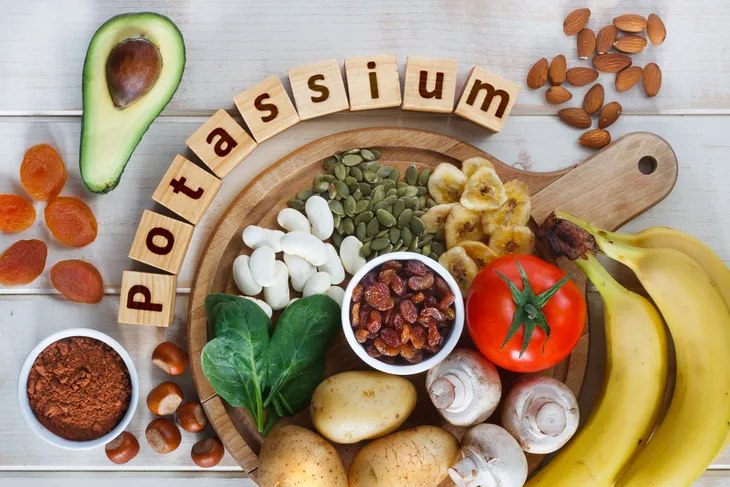 Shutterstock/Evan Lorne
Shutterstock/Evan LorneConsult Professional About Surgical Methods
If you’ve tried many of these lifestyle methods and still haven’t seen the results you’re looking for, another option is to consult a professional about cosmetic surgery. There are quite a few different procedures that target puffy eyes, but a common one is blepharoplasty, which is eyelid surgery where a doctor moves or removes excess fat, muscle, and skin on your eyelid.
There are also less invasive options such as laser treatments, chemical peels, or prescription medications to help remedy puffy eyes.
 Shutterstock/ldutko
Shutterstock/ldutkoWhen to See a Doctor
Puffy eyes typically aren’t a sign of a serious medical condition, but there are occasions where it might be best to consult a doctor. It’s recommended to consult a doctor if you experience long-lasting puffy eyes or pain, irritation and severe swelling in the eye area.
These more intense symptoms could be the result of a health condition such as pink eye (conjunctivitis), eyelid inflammation (blepharitis), drooping eyelids (ptosis), cellulitis, dermatitis or thyroid eye disease.
